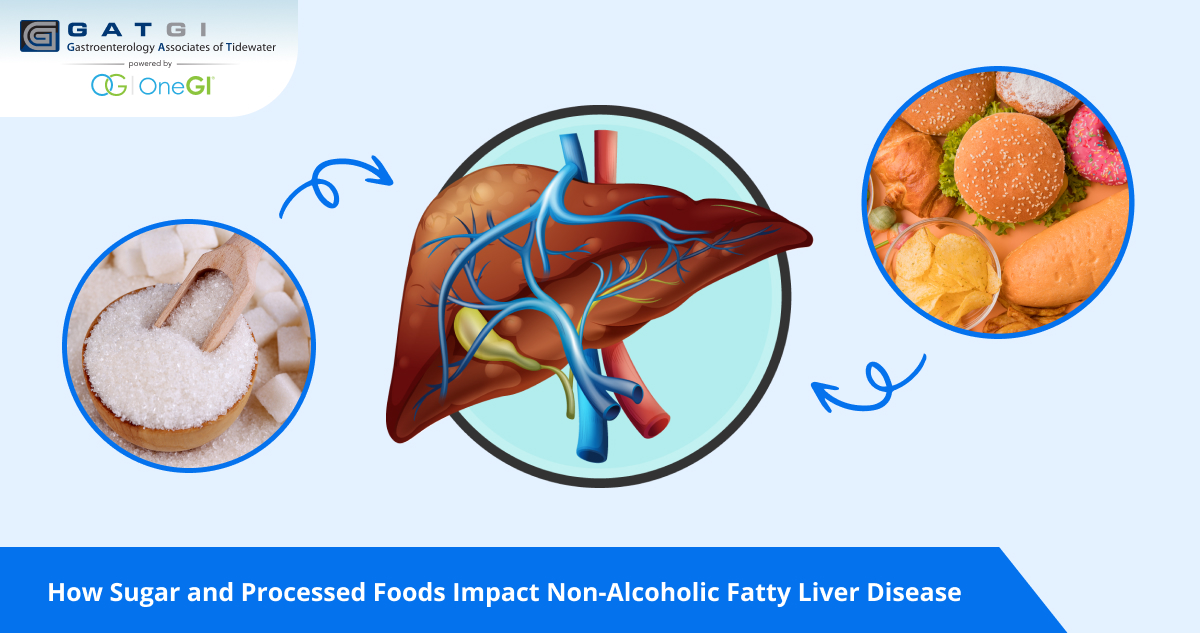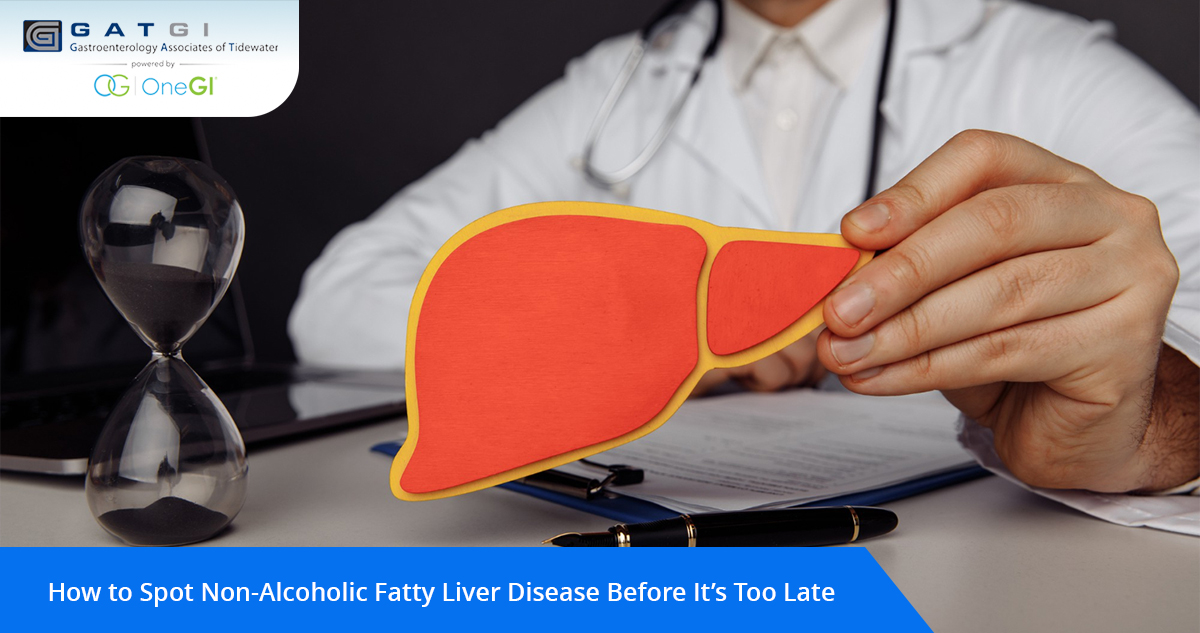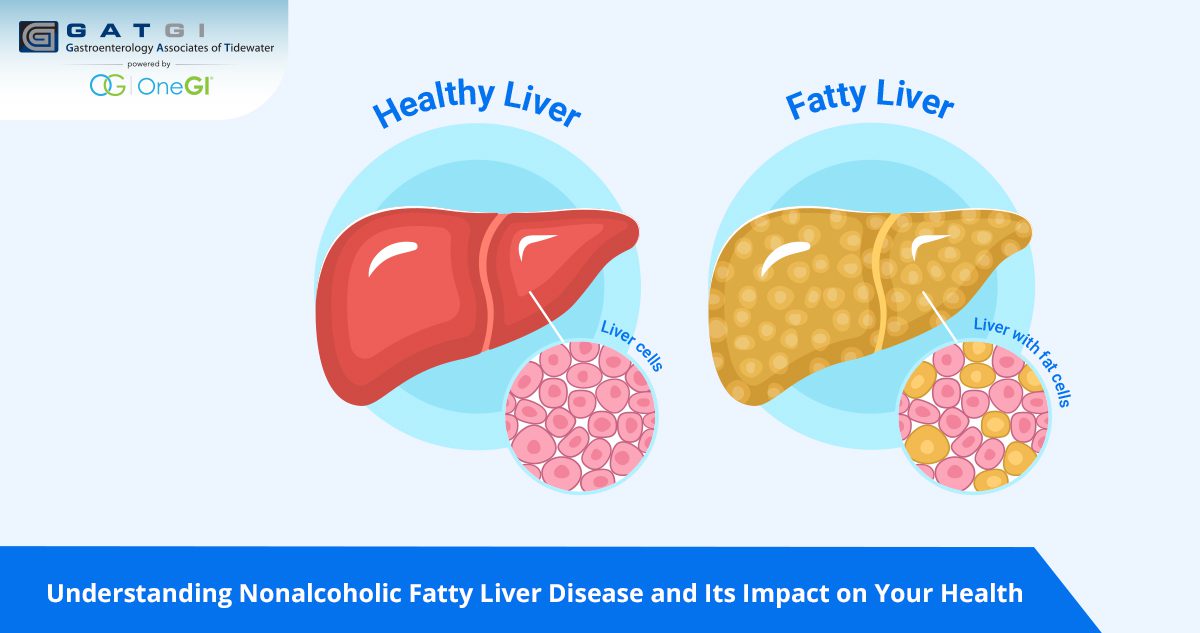Non-Alcoholic Fatty Liver Disease (NAFLD) is becoming one of the most common liver conditions worldwide, and it’s not caused by alcohol. Instead, it’s often linked to modern dietary habits, exceptionally high sugar intake, and processed foods. Many people wonder how what we eat affects our liver, and whether changing our diet can truly make a difference.
In this article, GATGI’s GI doctors in Chesapeake, VA, explore what NAFLD is, how sugar and processed foods impact liver health, what causes fatty liver disease, and which foods to avoid. Most importantly, we’ll show how wise nutrition choices can protect your liver and overall well-being.
Table of Contents
Understanding Non-Alcoholic Fatty Liver Disease
Non-Alcoholic Fatty Liver Disease occurs when excess fat builds up in liver cells in people who drink little or no alcohol. The liver normally contains some fat, but when fat accounts for more than 5–10% of its weight, it’s considered fatty liver disease.
NAFLD can range from simple fat accumulation (called steatosis) to a more serious condition known as non-alcoholic steatohepatitis (NASH), where inflammation and liver cell damage can lead to fibrosis (scarring), cirrhosis, or even liver cancer.
Who’s at risk?
- People who are overweight or obese
- Those with type 2 diabetes or insulin resistance
- Individuals with high cholesterol or triglycerides
- People with metabolic syndrome
Many cases develop silently, with no symptoms in the early stages. Routine blood tests or imaging may be the first sign something’s wrong.
The Relationship Between Sugar and Liver Health
Sugar doesn’t just affect your teeth or waistline; it also plays a significant role in liver health. The primary concern is fructose, a type of sugar found in sweetened beverages, desserts, and many processed foods.
Unlike glucose, which every cell in your body can use for energy, fructose is primarily metabolized in the liver. When consumed in excess, the liver converts fructose into fat. Over time, this process can lead to fat accumulation, insulin resistance, and inflammation — all of which contribute to fatty liver disease.
The biggest culprits:
- Sugary drinks (sodas, fruit juices, energy drinks)
- Desserts and pastries
- Flavored yogurts and cereals
- Processed snacks with added sugars
Studies show that people who drink high amounts of sugary beverages are more likely to develop NAFLD, even if they aren’t overweight. Cutting back on added sugars can significantly reduce liver fat within weeks.
Processed Foods and Liver Damage
Processed foods are everywhere, from frozen dinners to fast-food burgers and packaged snacks. Unfortunately, many are high in refined carbohydrates, unhealthy fats, salt, and artificial additives, all of which can strain the liver.
Highly processed foods often contain:
- Trans fats and hydrogenated oils
- High fructose corn syrup
- Refined grains with little fiber
- Preservatives and flavor enhancers
These ingredients not only promote fat buildup in the liver but also increase oxidative stress and inflammation — two key drivers of liver cell damage. Research has linked diets high in ultra-processed foods with greater risks of metabolic syndrome, obesity, and NAFLD progression.
Eating whole, minimally processed foods, like fresh fruits, vegetables, lean proteins, and whole grains, helps the liver function more efficiently and repair itself.
Causes of Fatty Liver Disease
While sugar and processed foods are major contributors, NAFLD develops from a combination of lifestyle and metabolic factors. Common causes include:
- Excess calorie intake — especially from sugary and high-fat foods
- Obesity, particularly abdominal fat
- Insulin resistance (when cells stop responding properly to insulin)
- High triglycerides or cholesterol
- Sedentary lifestyle
- Poor gut health and inflammation
Genetics can also play a role — some people are more likely to store fat in the liver even with modest dietary indulgence. Hence, it is essential to get gastrointestinal disease treatment right when you see the first symptom. Click here to learn more about the available treatment options.
Foods That Harm Your Liver
Certain foods are more likely to worsen fatty liver or accelerate its progression. If you’ve been diagnosed with NAFLD or want to prevent it, try limiting these:
- Sugary drinks (soda, sweetened coffee, fruit juice)
- Processed meats (bacon, sausage, hot dogs)
- Refined grains (white bread, pasta, pastries)
- Fried foods
- Fast food and frozen meals
- Alcohol, even in moderate amounts, can be problematic for some people
Instead, focus on liver-friendly foods such as:
- Leafy greens and colorful vegetables
- Whole fruits (in moderation)
- Oats, quinoa, and brown rice
- Fatty fish (like salmon or sardines)
- Nuts, seeds, and olive oil
A Mediterranean-style diet rich in healthy fats and antioxidants is one of the best ways to support liver health and reduce inflammation.
How Diet Affects Fatty Liver
Your daily diet can either help your liver heal or make it work harder. Reducing sugar and processed foods allows the liver to metabolize fats more effectively, helping reduce fat buildup.
Key dietary strategies for a healthier liver:
- Cut out added sugars and replace sugary drinks with water or unsweetened tea
- Choose whole, unprocessed foods as often as possible
- Add fiber from fruits, vegetables, and whole grains to improve digestion and reduce fat absorption
- Eat lean protein to help the liver repair itself
- Stay hydrated to support natural detoxification
- Exercise regularly, which boosts metabolism and reduces liver fat
Lifestyle changes can reverse early stages of NAFLD — sometimes within months — before permanent liver damage occurs.
Experiencing symptoms of NAFLD? Schedule an appointment with GATGI in Chesapeake, VA, to discuss your options!
Non-Alcoholic Fatty Liver Disease is closely tied to the modern diet, especially excess sugar and processed foods. The good news is that with informed choices and consistent habits, you can protect your liver and even reverse early damage. Limiting sugary drinks, refined carbs, and processed snacks while focusing on whole, nutrient-rich foods makes a remarkable difference.
If you suspect fatty liver or want to improve your liver health, schedule a gastroenterology appointment in Chesapeake, VA, for expert consultation and personalized guidance on managing your digestive and metabolic health.







